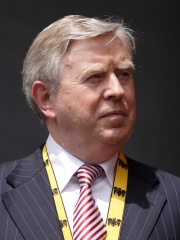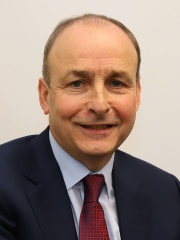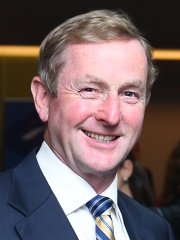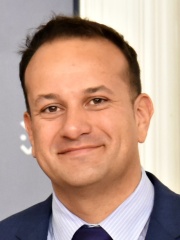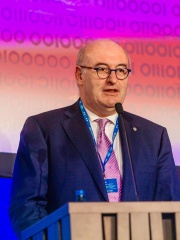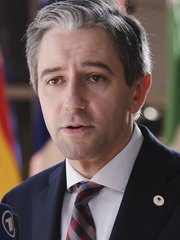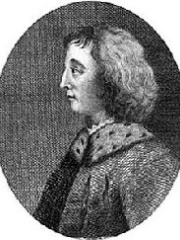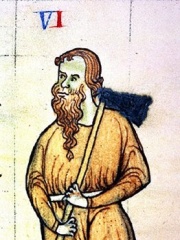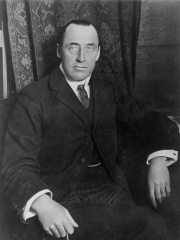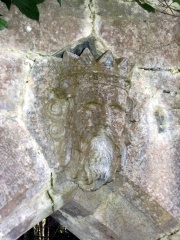
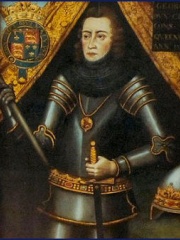
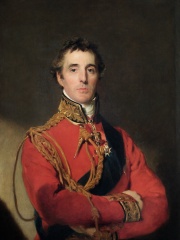
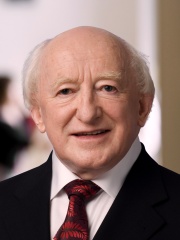
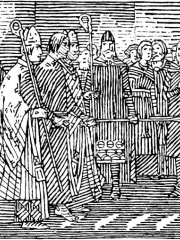
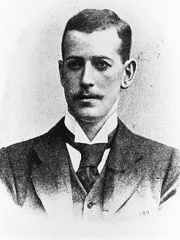
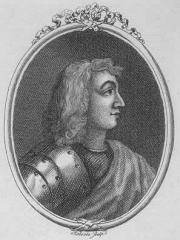
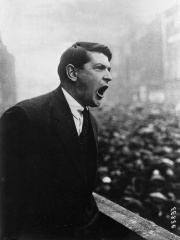
The Most Famous
POLITICIANS from Ireland
This page contains a list of the greatest Irish Politicians. The pantheon dataset contains 19,576 Politicians, 71 of which were born in Ireland. This makes Ireland the birth place of the 47th most number of Politicians behind Croatia, and Slovakia.
Top 10
The following people are considered by Pantheon to be the top 10 most legendary Irish Politicians of all time. This list of famous Irish Politicians is sorted by HPI (Historical Popularity Index), a metric that aggregates information on a biography's online popularity. Visit the rankings page to view the entire list of Irish Politicians.

1. Edmund Burke (1729 - 1797)
With an HPI of 75.69, Edmund Burke is the most famous Irish Politician. His biography has been translated into 80 different languages on wikipedia.
Edmund Burke (; 12 January [NS] 1729 – 9 July 1797) was an Anglo-Irish writer, philosopher, and politician who is widely credited as the founder of the cultural and political philosophy of conservatism. Regarded as one of the most influential conservative thinkers and political writers of the 18th century, Burke spent the majority of his career in Great Britain and was elected as a member of Parliament (MP) from 1766 to 1794 in the House of Commons of Great Britain with the Whig Party. His writings played a significant role in influencing public views and opinions in both Great Britain and France following the French Revolution in 1789, and he remains a major figure in modern conservative circles. Burke was a proponent of underpinning virtues with manners in society and of the importance of religious institutions for the moral stability and good of the state. These views were expressed in his satirical work, A Vindication of Natural Society (1756). He also criticised the actions of the British government towards the American colonies, including its taxation policies. Burke supported the rights of the colonists to resist metropolitan authority, although he opposed the attempt to achieve independence. He is further remembered for his long-term support for Catholic emancipation, the impeachment of Warren Hastings from the East India Company, and his opposition to the French Revolution. In 1774, Burke was elected a member of Parliament for Bristol. In his Reflections on the Revolution in France (1790), Burke asserted that the revolution was destroying the fabric of good society and traditional institutions of state and society, and he condemned the persecution of the Catholic Church that resulted from it. This led to his becoming a popular leading figure within the conservative faction of the Whig Party which he dubbed the Old Whigs as opposed to the pro-French Revolution New Whigs led by Charles James Fox. Burke had a close relation with some of the public intellectuals of his time, including Samuel Johnson, David Garrick, Oliver Goldsmith and Joshua Reynolds. In his debates, he often argued against unrestricted ruling power and the importance of political parties having the ability to maintain a principled opposition that was capable of preventing abuse of power. In the 19th century, Burke was praised by both conservatives and liberals. Subsequently, in the 20th century, he became widely regarded, especially in the United States and the United Kingdom, as the philosophical founder of conservatism, along with his ultra-royalist and ultramontane counterpart Joseph de Maistre. His writings and literary publications influenced British conservative thought to a great extent, and helped establish the earliest foundations for modern conservatism and liberal democracy.

2. George Plantagenet, 1st Duke of Clarence (1449 - 1478)
With an HPI of 75.00, George Plantagenet, 1st Duke of Clarence is the 2nd most famous Irish Politician. His biography has been translated into 33 different languages.
George Plantagenet, Duke of Clarence (21 October 1449 – 18 February 1478), was the sixth child and third surviving son of Richard Plantagenet, 3rd Duke of York, and Cecily Neville, and the brother of English kings Edward IV and Richard III. He played an important role in the dynastic struggle between rival factions of the Plantagenets now known as the Wars of the Roses. Though a member of the House of York, he switched sides to support the House of Lancaster, before reverting to the Yorkists. He was later convicted of treason against his elder brother, Edward IV, and executed, allegedly by drowning in malmsey wine. He appears as a character in William Shakespeare's plays Henry VI, Part 3 and Richard III, in which his death is attributed to the machinations of Richard.

3. Arthur Wellesley, 1st Duke of Wellington (1769 - 1852)
With an HPI of 74.95, Arthur Wellesley, 1st Duke of Wellington is the 3rd most famous Irish Politician. His biography has been translated into 81 different languages.
Field Marshal Arthur Wellesley, 1st Duke of Wellington (né Wesley; 1 May 1769 – 14 September 1852) was an Anglo-Irish British Army officer and statesman who was one of the leading military and political figures in Britain during the early 19th century, twice serving as Prime Minister of the United Kingdom. He was one of the British commanders who ended the Anglo-Mysore wars by defeating Tipu Sultan in 1799, and among those who ended the Napoleonic Wars in a Coalition victory when the Seventh Coalition defeated Napoleon at the Battle of Waterloo in 1815. Wellesley was born into a Protestant Ascendancy family in Dublin, in the Kingdom of Ireland. He was commissioned as an ensign in the British Army in 1787, serving in Ireland as aide-de-camp to two successive lords lieutenant of Ireland. He was also elected as a member of Parliament in the Irish House of Commons. Rising to the rank of colonel by 1796, Wellesley served in the Flanders campaign before being sent to India, where he fought in the Fourth Anglo-Mysore War, ending the conflict with a victory at Seringapatam in 1799. He was appointed governor of Seringapatam and Mysore and, as a newly appointed major-general, won a decisive victory over the Maratha Confederacy at the Battle of Assaye in 1803. Rising to prominence as a general officer during the Peninsular War, Wellesley was promoted to field marshal after leading British-led forces to victory against a French army at the Battle of Vitoria in 1813. Following Napoleon's first exile in 1814, he served as the British ambassador to France and was made Duke of Wellington. During the Hundred Days campaign in 1815, Wellington commanded another British-led army which, together with a Prussian army under Field Marshal Gebhard von Blücher, defeated Napoleon at Waterloo. After the end of his active military career, Wellington returned to politics, becoming a prominent member of the British Tory party. He served as prime minister from 1828 to 1830, as well as on an interim basis for a little less than a month in 1834. Wellington oversaw the passage of the Roman Catholic Relief Act 1829 and opposed the Reform Act 1832. He continued to be one of the leading figures in the House of Lords until his retirement in 1846 and remained Commander-in-Chief of the Forces until his death in 1852.

4. Michael D. Higgins (b. 1941)
With an HPI of 71.57, Michael D. Higgins is the 4th most famous Irish Politician. His biography has been translated into 82 different languages.
Michael Daniel Higgins (Irish: Mícheál Dónal Ó hUigínn; born 18 April 1941) is an Irish politician, poet and broadcaster who served as the president of Ireland from November 2011 to November 2025. Entering national politics through the Labour Party, he served as a senator from 1973 to 1977 and a Teachta Dála (TD) from 1981 to 1982, returning to the Seanad from 1983 to 1987 and the Dáil from 1987 to 2011. He served as minister for arts, culture and the Gaeltacht from 1993 to 1997 and as mayor of Galway from 1981 to 1982 and 1990 to 1991. Higgins was elected president of Ireland in 2011 after being nominated by the Labour Party. He ran for a second term in 2018 and was re-elected in a landslide victory, with his 822,566 first-preference votes being the largest personal mandate in the history of the Republic of Ireland until Catherine Connolly's election as president in 2025. His second presidential inauguration took place on 11 November 2018. Higgins used his presidency to address issues concerning justice, social equality, social inclusion, anti-sectarianism, anti-racism, and reconciliation. He made the first state visit by an Irish president to the United Kingdom in April 2014.
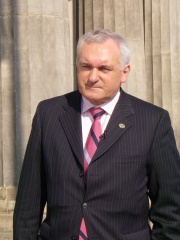
5. Bertie Ahern (b. 1951)
With an HPI of 71.46, Bertie Ahern is the 5th most famous Irish Politician. His biography has been translated into 48 different languages.
Bartholomew Patrick "Bertie" Ahern (born 12 September 1951) is an Irish former Fianna Fáil politician who served as Taoiseach from 1997 to 2008, and as Leader of Fianna Fáil from 1994 to 2008. A Teachta Dála (TD) from 1977 to 2011, he served as Leader of the Opposition from 1994 to 1997. He was also Lord Mayor of Dublin from 1986 to 1987, Tánaiste from November to December 1994, and Minister for Finance from 1991 to 1994. Fianna Fáil led three coalition governments under Ahern's leadership; he is the second-longest serving Taoiseach, after Éamon de Valera. He resigned as Taoiseach on 6 May 2008, in the wake of revelations made by the Mahon Tribunal over payments received from developers; he was succeeded by Brian Cowen. Fianna Fáil proposed to expel politicians censured by the tribunal, but Ahern resigned his membership prior to the expulsion motion. In 2016, Fianna Fáil announced that it had given Ahern the option of rejoining the party. He rejoined in February 2023.

6. Harald Gille (1103 - 1136)
With an HPI of 71.10, Harald Gille is the 6th most famous Irish Politician. His biography has been translated into 34 different languages.
Harald Gille (Old Norse: Haraldr Gilli / Haraldr Gillikristr, c. 1102 − 14 December 1136), also known as Harald IV, was king of Norway from 1130 until his death. His byname Gille is probably from Middle Irish Gilla Críst 'servant of Christ'.

7. John Boland (1870 - 1958)
With an HPI of 69.64, John Boland is the 7th most famous Irish Politician. His biography has been translated into 31 different languages.
John Mary Pius Boland (16 September 1870 – 17 March 1958) was an Irish Nationalist politician, and Member of Parliament (MP) in the House of Commons of the United Kingdom of Great Britain and Ireland and as member of the Irish Parliamentary Party for South Kerry from 1900 to 1918. He was also noteworthy as a gold medallist tennis player at the first modern Olympics.

8. Causantín mac Cináeda (836 - 877)
With an HPI of 68.81, Causantín mac Cináeda is the 8th most famous Irish Politician. His biography has been translated into 44 different languages.
Causantín mac Cináeda (Modern Gaelic: Còiseam mac Choinnich; c. 836 – 877) was King of the Picts from 862 until his death in 877. He is often known as Constantine I in reference to his place in modern lists of Scottish monarchs, but contemporary sources described Causantín only as a Pictish king. A son of Cináed mac Ailpín ("Kenneth MacAlpin"), he succeeded his uncle Domnall mac Ailpín as Pictish king following the latter's death on 13 April 862. The reign of Causantín likely saw increased activity by Vikings, based in Ireland, Northumbria and northern Britain. He died fighting one such invasion.

9. Michael Collins (1890 - 1922)
With an HPI of 68.59, Michael Collins is the 9th most famous Irish Politician. His biography has been translated into 63 different languages.
Michael Collins (Irish: Mícheál Ó Coileáin; 16 October 1890 – 22 August 1922) was an Irish revolutionary, soldier and politician who was a leading figure in the early-20th century struggle for Irish independence. During the War of Independence he was Director of Intelligence of the Irish Republican Army (IRA). He served in the government of the self-declared Irish Republic as the Minister for Home Affairs and later as the Minister for Finance. He was Chairman of the Provisional Government of the Irish Free State from January 1922 and commander-in-chief of the National Army from July until his death in an ambush in August 1922, during the Civil War. Collins was born in Woodfield, County Cork, the youngest of eight children. He moved to London in 1906 to become a clerk in the Post Office Savings Bank at Blythe House. He was a member of the London GAA, through which he became associated with the Irish Republican Brotherhood and the Gaelic League. He returned to Ireland in January 1916 and fought in the Easter Rising. He was taken prisoner and held in the Frongoch internment camp as a prisoner of war, but he was released in December 1916. Collins subsequently rose through the ranks of the Irish Volunteers and Sinn Féin. He was elected as MP for South Cork in December 1918. Sinn Féin's elected members (later known as TDs) formed an Irish parliament, the First Dáil, in January 1919 and declared the independence of the Irish Republic. Collins was appointed Minister for Finance. In the ensuing War of Independence, he was Director of Organisation and Adjutant General for the Irish Volunteers, and Director of Intelligence of the IRA. He gained fame as a guerrilla warfare strategist, planning many successful attacks on British forces together with 'the Squad', such as the "Bloody Sunday" assassinations of key British intelligence agents in November 1920. After the July 1921 ceasefire, Collins was one of five plenipotentiaries sent by the Dáil cabinet at the request of Éamon de Valera, to negotiate peace terms in London. The resulting Anglo-Irish Treaty, signed in December 1921, would establish the Irish Free State but depended on an oath of allegiance to the Crown. De Valera and other republican leaders found this clause of the treaty most difficult to accept. Collins viewed the treaty as offering "the freedom to achieve freedom", and helped persuade a majority of the Dáil to ratify the treaty. A provisional government was formed under his chairmanship in early 1922. During this time he secretly provided support for an IRA offensive in Northern Ireland. It was soon disrupted by the Irish Civil War, in which Collins was commander-in-chief of the National Army. He was shot and killed in an ambush by anti-Treaty forces in August 1922.
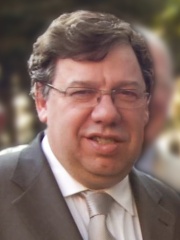
10. Brian Cowen (b. 1960)
With an HPI of 68.47, Brian Cowen is the 10th most famous Irish Politician. His biography has been translated into 48 different languages.
Brian Bernard Cowen (born 10 January 1960) is an Irish former politician who served as Taoiseach and Leader of Fianna Fáil from 2008 to 2011. Cowen served as a TD for the constituency of Laois–Offaly from 1984 to 2011 and served in several ministerial roles between 1992 and 2011, including as Minister for Finance from 2004 to 2008 and Tánaiste from 2007 to 2008. Cowen was elected leader of Fianna Fáil in May 2008, upon the resignation of Bertie Ahern, and was nominated by Dáil Éireann to replace him as Taoiseach. Weeks after taking office, his administration faced the Irish financial and banking crises. He received substantial criticism for his failure to stem the tide of either crisis, ultimately culminating in the Irish Government's formal request for financial aid from the European Union and the International Monetary Fund, which was widely regarded in Ireland as a national humiliation. His leadership subsequently saw public support for Fianna Fáil plunge to record lows, and Cowen set a record for the lowest approval rating in the history of Irish opinion polling, at one point reaching an approval rating of 8 per cent. In January 2011, following a failed attempt at a cabinet reshuffle, and facing growing political pressure, Cowen resigned as Leader of Fianna Fáil, but remained as Taoiseach until after the general election held the following month where Cowen left politics and officially resigned as Taoiseach and left office a fortnight later. He is the only leader of Fianna Fáil not to take the party into an election. The Sunday Times described Cowen's tenure as Taoiseach as "a dismal failure". In 2011, the Irish Independent called Cowen the "worst Taoiseach in the history of the State".
People
Pantheon has 71 people classified as Irish politicians born between 836 and 1986. Of these 71, 17 (23.94%) of them are still alive today. The most famous living Irish politicians include Michael D. Higgins, Bertie Ahern, and Brian Cowen. The most famous deceased Irish politicians include Edmund Burke, George Plantagenet, 1st Duke of Clarence, and Arthur Wellesley, 1st Duke of Wellington. As of April 2024, 3 new Irish politicians have been added to Pantheon including Simon Harris, Clare Daly, and Paschal Donohoe.
Living Irish Politicians
Go to all RankingsMichael D. Higgins
1941 - Present
HPI: 71.57
Bertie Ahern
1951 - Present
HPI: 71.46
Brian Cowen
1960 - Present
HPI: 68.47
Mary Robinson
1944 - Present
HPI: 65.32
Pat Cox
1952 - Present
HPI: 60.41
Micheál Martin
1960 - Present
HPI: 59.38
Enda Kenny
1951 - Present
HPI: 58.12
Leo Varadkar
1979 - Present
HPI: 49.41
Michelle O'Neill
1977 - Present
HPI: 46.51
Mary Lou McDonald
1969 - Present
HPI: 45.19
Phil Hogan
1960 - Present
HPI: 44.23
Simon Harris
1986 - Present
HPI: 44.21
Deceased Irish Politicians
Go to all RankingsEdmund Burke
1729 - 1797
HPI: 75.69
George Plantagenet, 1st Duke of Clarence
1449 - 1478
HPI: 75.00
Arthur Wellesley, 1st Duke of Wellington
1769 - 1852
HPI: 74.95
Harald Gille
1103 - 1136
HPI: 71.10
John Boland
1870 - 1958
HPI: 69.64
Causantín mac Cináeda
836 - 877
HPI: 68.81
Michael Collins
1890 - 1922
HPI: 68.59
Malcolm II of Scotland
954 - 1034
HPI: 65.26
Diarmait Mac Murchada
1110 - 1171
HPI: 65.19
Brian Boru
941 - 1014
HPI: 64.11
Edward Carson
1854 - 1935
HPI: 63.79
Ruaidrí Ua Conchobair
1116 - 1198
HPI: 63.72
Newly Added Irish Politicians (2025)
Go to all RankingsSimon Harris
1986 - Present
HPI: 44.21
Clare Daly
1968 - Present
HPI: 39.76
Paschal Donohoe
1974 - Present
HPI: 37.61
Overlapping Lives
Which Politicians were alive at the same time? This visualization shows the lifespans of the 25 most globally memorable Politicians since 1700.


